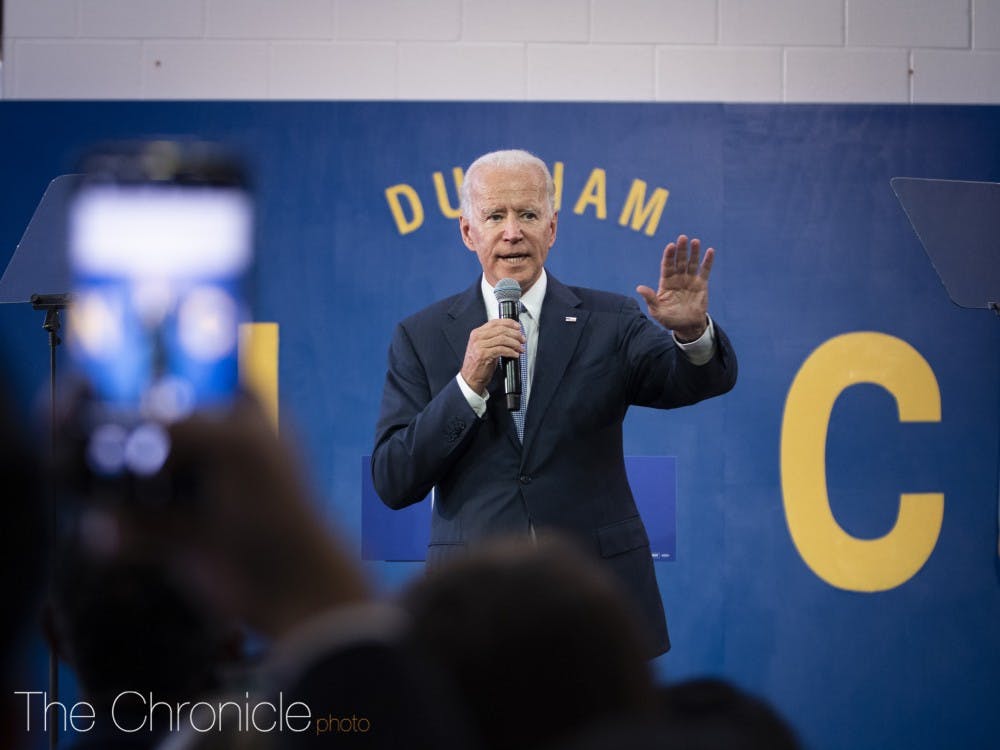When Joe Biden is sworn in as the 46th president, college students across the country can expect the potential of sweeping changes to a number of higher education policies.
On the campaign trail, Biden has advocated for policy changes on issues such as alleviating the burden of student debt, making higher education more affordable and accessible, and repealing many of the current Department of Education’s rule changes.
Many of Biden’s policy proposals will likely depend on Democratic control of the Senate, which will be decided by two runoff elections in Georgia on January 5th. However, Biden will be able to make some changes through executive orders and Department of Education regulations.
For one, Duke students who are recipients of the Deferred Action for Childhood Arrivals program, among 216,000 DACA-eligible college students in the country, will no longer face the threat of deportation, as Biden has promised to reinstate the Obama-era policy. (Though court challenges to the program remain.)
In addition, Biden has signaled that his Department of Education will undo the changes that current Secretary of Education Betsy DeVos made in May to Title IX rules, which prevent sex-based discrimination in educational institutions receiving federal funding.
Kimberly Hewitt, vice president for institutional equity and chief diversity officer, said that under the rule changes instituted by DeVos, “what we think of, traditionally, as sexual harassment, has been defined much more narrowly” as “unwelcome conduct that’s objectively offensive and denies one access to employment, which is a much higher bar to meet."
Hewitt said that DeVos’ changes also “require live hearings with cross-examinations of witnesses” in cases involving complaints against employees, “when the facts of the case meet the revised definition of sexual harassment.”
However, the scope of these new rules have been limited, since Duke has a much broader institutional definition of sexual harassment.
If the Biden administration rolls back these changes, Hewitt said “the way we’ve structured our policy, it would be easy to remove the procedures that are [in accordance] with the new Title IX regulations from the Trump administration,” but she emphasized that there is a lot of uncertainty over how the repeal of these rules would be structured.
Hewitt said that a working group responsible for reviewing Title IX compliance will come together again in February, when they know more about what this administration will do, in order to “review what worked and what didn’t work [under the current rules], and anticipate what the future might look like at Duke”.
In addition, Biden has campaigned on making college more affordable to low income Americans. He’s promised to make public colleges and universities tuition free for families earning less than $125,000 annually.
Charles Clotfelter, Z. Smith Reynolds distinguished professor of public policy studies and a professor of economics and law, said that this policy “will certainly make public institutions more competitive, but probably won’t have a first-round effect on Duke,” a private university.
He said that along with these policy changes, the effects of the COVID-19 pandemic on online learning have “made institutions look at possibilities for teaching that otherwise would have taken a lot longer,” potentially playing a role down the road in reducing the costs of attending private colleges like Duke as well.
Biden also plans to double the maximum size of Pell Grants, federal financial aid awards, because the grant has not kept up with the rising costs of college.
Clotfelter noted that the Pell program is “one of the most direct ways to open up opportunities for college enrollment for low income students”. He said that doubling the Pell Grant would be beneficial to Duke in its efforts to have an economically diverse group of students attending the university, as well as to colleges across the country.
As for addressing student debt, Biden plans to alter income-based debt repayment plans so that anyone earning less than $25,000 per year will not have to make any repayments on their undergraduate federal student loans, and will not accrue interest. Anyone earning over $25,000 will pay only 5% of their discretionary income over this threshold. He also plans to change the tax code so that forgiven debt will no longer be treated as taxable income down the road. In addition, Biden has also called for cancelling $10,000 in federal student debt per borrower through legislation.
“This issue of student loans has really grown into a monster over a relatively short number of decades. It’s now something that is a major factor in a whole generation… and then, along comes this mammoth recession that’s hitting a lot of people in the gut,” Clotfelter said.
Clotfelter also noted that the implications of these policies would be less meaningful for Duke than for other institutions, because “we’re sending out graduates every year with debt, but not as many, proportionally, as other places are.”
Corrections: An earlier version of this article incorrectly stated that Duke does not use live hearings for sexual harassment cases unless they meet federal standards, and it has been updated to remove that information. An earlier version incorrectly stated that Duke expects the Biden administration to roll back Title IX changes, and it has been updated to reflect that Kimberly Hewitt was speaking to Duke's response if the rules are in fact rolled back. The Chronicle regrets the errors.
Get The Chronicle straight to your inbox
Signup for our weekly newsletter. Cancel at any time.
Anisha Reddy is a Trinity junior and a senior editor of The Chronicle's 118th volume.

